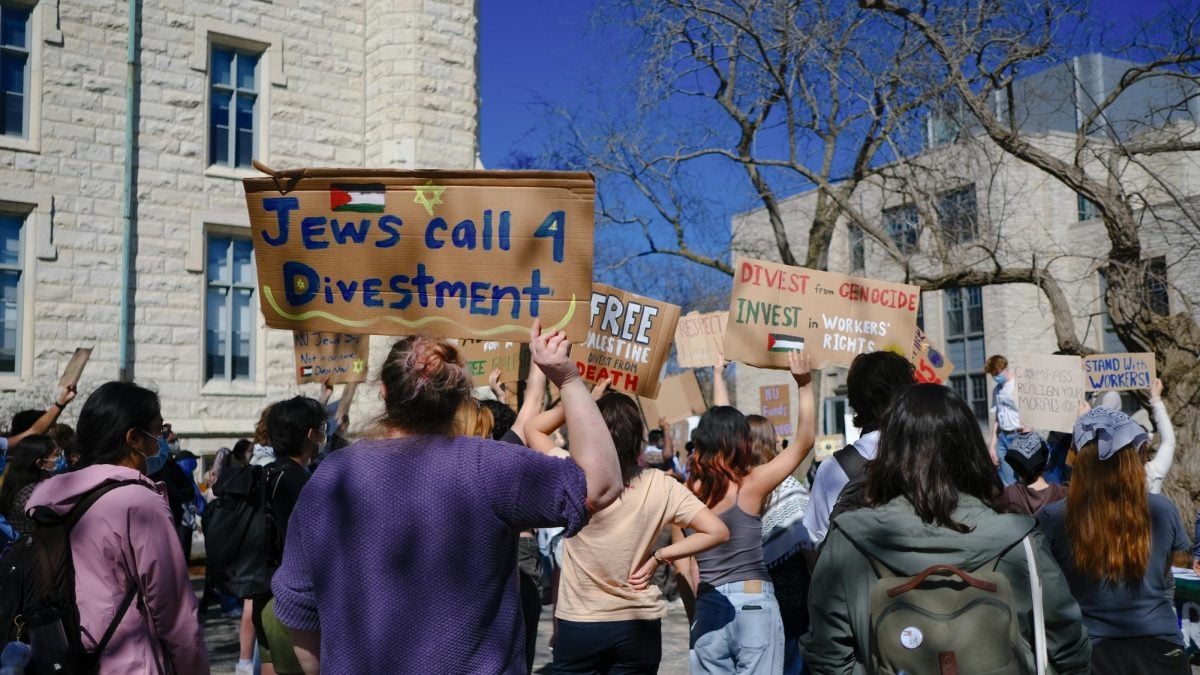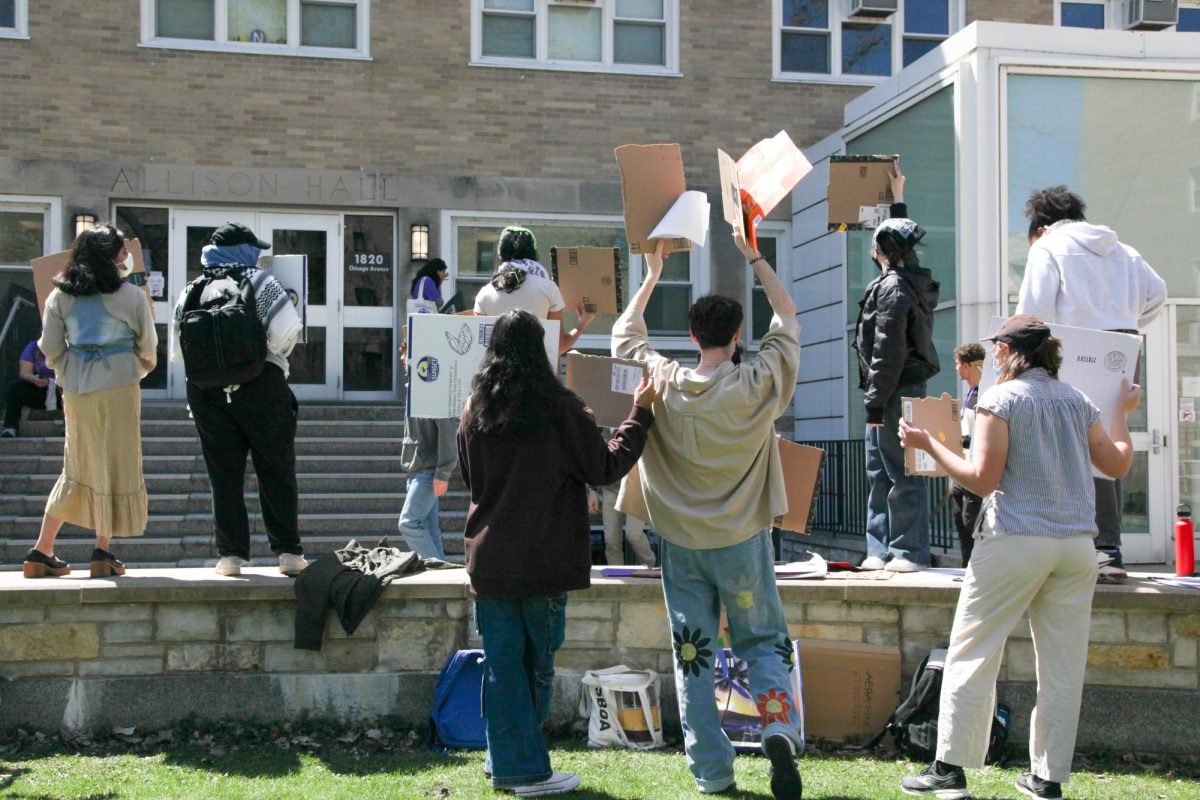Newly admitted Northwestern students visiting the University for Wildcat Days experienced a different dining experience at Sargent Hall and Allison Hall midday Monday. Though the lines to enter each poured out of the front doors as usual, signs declaring that “NU loves colonizers” and that its “tuition bills fund genocide” lined the dining halls.
NU chapters of Students for Justice in Palestine, Educators for Justice in Palestine, Jewish Voice for Peace, Fossil Free Northwestern and Students Organizing for Labor Rights co-hosted the daylong protest. During it, they advocated for the University’s divestment from fossil fuel contributors, the removal of John Evans’ colonial legacy on campus, increased labor rights for campus workers and a ceasefire in the Gaza Strip.
Demonstrators outside Sargent and Allison handed out flyers that welcomed admitted students to what they called the “real Northwestern” around noon. It alleged that the University exploits its workers, abuses the environment and remains complicit in the Israeli occupation of the West Bank and continued presence in Gaza.
“NU, NU, you can’t hide, we charge you with genocide,” several protesters chanted as early as 10:50 a.m. by University Hall. “Shame, shame board of trustees, funding Zionist companies.”
Some University trustees have served as executives at companies that supply arms to Israel, including Boeing and General Dynamics.
SJP organizers advocated for the U.S. government and Evanston Mayor Daniel Biss to call for a ceasefire in Palestine.
The rally comes as Israel’s ground and air offensive in Gaza has killed more than 33,000 Palestinians, according to Palestinian officials. Israel’s military action follows the militant group Hamas’ Oct. 7 attack on Israel which killed about 1,200 Israelis, according to Israeli authorities.
The group of students later made their way down to The Arch, where they continued their chants and protests. Around 3:00 p.m., more than 100 demonstrators arrived to rally at The Rock.
“Admitted Students Day is a very curated experience for students, and that really blinds us to some of the things going on,” said SESP sophomore Anusha Kumar, a Fossil Free NU and SOLR member. “It was really a great opportunity to work with organizations that have similar value(s) and show that solidarity.”
University spokesperson Eliza Larson wrote in an email to The Daily that NU, like other college campuses, is home to “robust debate and engaged students,” and “fully supports (the) community’s right to peaceful protest.”
Red megaphone in hand, SOLR member and Weinberg junior Julián Fefer spoke about the need for better working conditions for service workers contracted by Compass Group, NU’s food service contractor.
“We’ve been trying to show you everything Northwestern won’t tell you, and a key part of that is how it treats its workers,” Fefer said. “We’re honored to stand here with you all to demand Northwestern treat workers and all members of our community humanely.”
Organizers said they started planning the protest this weekend. Bienen and Communication sophomore Selina Liu said the high turnout demonstrated that the issues that the organizations rallied for reached institutions beyond just NU.
“I want to highlight that not only are our organizations in solidarity with each other, a lot of the issues that we stand for are connected,” Liu, a SOLR and Fossil Free NU member, said. “It is a Northwestern, Evanston issue, U.S. issue and international issue.”
Communication senior Jordan Muhammad, who is a Fossil Free NU and SJP member and uses ki/kis pronouns, said ki hoped Monday’s movement helped students learn new ways to be involved in campus activism.
“We cannot continue to go on as ‘business as usual,’” Muhammad said. “We must also hold in our hearts all the interconnected struggles that are happening right now.”
Muhammad added that student activism does not necessarily have to take the form of organizing rallies — activist groups also need people like researchers and graphic designers, ki said.
Ahmad Hamadeh, a parent of a newly admitted NU student, watched the rally. Hamadeh said he was “proud” to see the way the University’s students and faculty engaged in open dialogue on campus.
“I was proud of the protest here in regards to the inhumanity that’s happening in Gaza as well as Lebanon,” Hamadeh said. “It encourages me to see the type of students and faculty that we have here at Northwestern and being able to point out inhumanities across the world.”
A student organizer from JVP who did not identify themselves called NU Hillel the “Zionist home of Jewish life on campus” in a speech during the rally.
“(Hillel) is one of the many ways in which this university is complicit in infusing Jewishness with Zionism,” the organizer said. “Judaism and Zionism are not the same.”
NU Hillel Executive Director Michael Simon said students are experiencing “a lot of concern and pain around the war,” and noted the recent escalation following Iran’s drone and missile barrage against Israel on Sunday.
“At spaces like Hillel, there’s real, thoughtful, nuanced conversation about the most challenging issues facing us,” Simon said. “I would hope anyone coming to Northwestern would come with an open mind and an open heart to engage across difference beyond rhetoric on a flier.”
Dean of Students and Assistant Vice President for Wellness Mona Dugo was also present at the rally. Dugo said she was present to ensure students have the “right to protest” and “protect the right to free speech.”
Weinberg junior and SOLR member Jinhee Heo said there is a perception of Northwestern being a relatively quiet campus compared to other universities. They said the goal of Monday’s protest was to disrupt this notion, and the turnout was emblematic of that.
“I think our university is basically a giant hedge fund with a little school attached,” Weinberg senior and JVP member Josh Fleckner said. “It was good that students showed that we don’t just sit idly by while nebulous, probably violent investments are being made.”
Correction: A previous version of this article incorrectly characterized the death toll in Gaza and the source of casualty statistics. According to Palestinian officials, more than 33,000 Palestinians have died since the beginning of the Israel-Hamas War. The Daily regrets the error.
Email: beavillaflor@u.northwestern.edu
Email: jerrywu2027@u.northwestern.edu
X: @jerrwu
Related Stories:
— Students repaint The Rock for Palestinian liberation after original message was painted over
— Students for Justice in Palestine hosts vigil to honor lives lost in Gaza this week




















